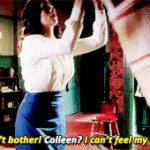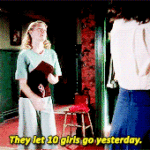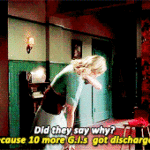Agent Carter addresses the postwar fate of the female workforce:
During the Second World War, women proved that they could do “men’s” work, and do it well. With men away to serve in the military, women made airplanes and warships, munitions and tanks, working in technical and scientific fields for the first time. They enjoyed the work, the good pay, the opportunities for advancement, and the excitement of working with other women and men on important jobs.
Most wanted to continue working after the war ended, yet women’s employment was only encouraged as long as the war was on. Once the war was over, federal and civilian policies replaced women workers with men. Many were fired from their jobs so the returning veterans could be re-employed. (x + x)
The war’s over, Rosie. Turn in your rivets. 8-
It didn’t just happen after WWII. It happened after every war. Women would be let out of their domestic cages, given agency, allowed, even forced, to do “men’s work,” which they discovered they were good at—and then the war would be over, their men would come home, mostly, and back to their cages they would go—mostly.

Just another WordPress site



